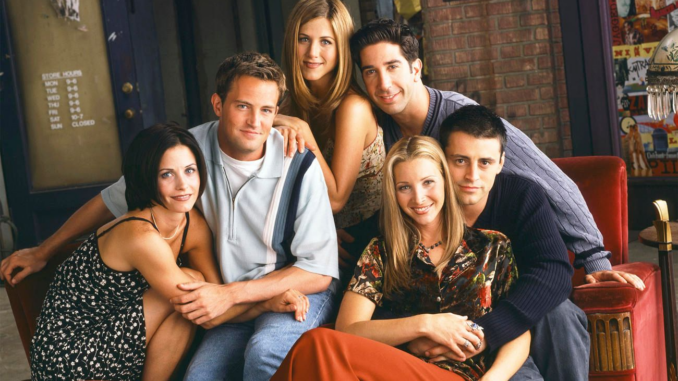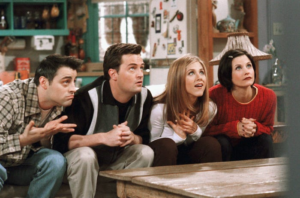
The TV sitcom Friends is beloved by millions around the world. The iconic coffee shop, the memorable catchphrases, and the hilarious dynamics between the six main characters have solidified Friends as a staple in American pop culture. But what if we told you that Friends may not have been the groundbreaking show many believe it to be? In fact, Friends was heavily inspired by another sitcom that debuted a whole year earlier!
This revelation might surprise you, but once you start looking into the similarities between the two shows, you’ll realize just how closely Friends mirrored its predecessor. So, what’s the deal? Was Friends a mere “copy” of a fan-favorite sitcom? Let’s break it down and explore the fascinating connections that link these two shows together.
A Quick Overview of Friends and Its Impact
Before we dive deep into the specifics, let’s first take a moment to acknowledge what made Friends such a phenomenon. The show, which ran from 1994 to 2004, was a massive success. It became a cultural touchstone, defining ’90s and early 2000s TV for millions of fans. The chemistry between Jennifer Aniston (Rachel), Courteney Cox (Monica), Lisa Kudrow (Phoebe), Matt LeBlanc (Joey), Matthew Perry (Chandler), and David Schwimmer (Ross) was electric, making each character an unforgettable part of TV history.
But despite its popularity, the similarities between Friends and another beloved sitcom from the early ’90s are undeniable.
The Unlikely Copycat: Coupling – The Sitcom That Came First
The show that many argue served as the blueprint for Friends is Coupling, a British sitcom that premiered in 1993, just one year before Friends hit American airwaves. Created by Steven Moffat, Coupling garnered a loyal fanbase and critical acclaim for its witty dialogue and clever exploration of relationships and modern dating.
What makes this even more interesting is the fact that Coupling was largely unnoticed in the U.S. until after Friends took off, leaving many to wonder if Friends was inspired by the British series. So, what exactly are the striking similarities between the two shows?
Striking Similarities Between Friends and Coupling
1. The Group Dynamic: A Similar Cast of Characters
In both Friends and Coupling, the central focus is on a tight-knit group of friends navigating their personal and romantic lives. The dynamics between these friends – their struggles, jokes, conflicts, and relationships – form the backbone of both shows.
In Friends, you had the six central characters – Ross, Rachel, Monica, Chandler, Joey, and Phoebe. Each character had their own quirks, but their interactions with each other were always central to the storylines. In Coupling, you had a similar ensemble: Susan, Steve, Sally, Patrick, Jeff, and Jane. While the characters were unique, they shared the same dynamic of close-knit friendships, relationships, and love triangles.
2. Romantic Entanglements and Love Triangles
One of the most enduring features of Friends was its constant exploration of romantic relationships and love triangles. Think about Ross and Rachel’s on-again, off-again romance, or the quirky but sweet relationship between Chandler and Monica. These dynamics were central to the show’s plot.
Similarly, Coupling was known for its portrayal of relationships, focusing on the hilarious ups and downs of dating in a modern world. Characters were often involved in complex romantic entanglements and love triangles, echoing Friends in many ways.
3. The Classic “Will They, Won’t They?” Trope
One of the most iconic aspects of Friends was the back-and-forth romance between Ross and Rachel. Fans were hooked on the question of whether these two would eventually end up together, and the suspense lasted for seasons. Coupling featured a similar will-they-won’t-they dynamic, especially between Susan and Steve, who share a slow-burning romance throughout the show.
Both shows capitalized on this tension to keep viewers coming back week after week, proving just how effective this trope can be in keeping audiences engaged.

The Same Yet Different: Unique Elements of Both Shows
While Friends and Coupling share many similarities, there are also some key differences that set them apart. Let’s explore what makes each of these shows unique, despite the clear influences between them.
4. The Setting: New York City vs. London
One of the most significant differences between Friends and Coupling is their setting. Friends takes place in the bustling, diverse New York City, a backdrop that became almost as iconic as the characters themselves. The show’s setting in the Big Apple influenced its storytelling, from the character-driven narratives to the big city energy.
On the other hand, Coupling was set in London, which brought its own flair to the series. While both cities are famous for their unique cultures and vibrant social scenes, the British humor and setting of Coupling gave it a distinct tone compared to the Americanized comedy of Friends.
5. Humor Style: American vs. British Comedy
The humor in Friends is often fast-paced, relying on punchlines and lighthearted jokes that appeal to a wide American audience. Meanwhile, Coupling is known for its sharp, clever, and often risque British humor. The British show’s wit is more subtle and character-driven, focusing on the awkwardness and absurdity of real-life relationships.
Did Friends Steal the Show? Theories and Controversies
While some argue that Friends wasn’t directly influenced by Coupling, it’s hard to ignore the striking similarities. So, did Friends take the formula from Coupling, or was it simply a case of parallel evolution? Let’s examine the theories behind the connection.
6. Was It Just a Coincidence?
Some fans argue that the similarities between Friends and Coupling are simply a coincidence, with both shows tapping into the universal themes of friendship, romance, and dating. After all, sitcoms about friendship and love have been around for decades, so it’s not outside the realm of possibility that two shows could have arrived at similar formulas independently.
7. The Influence of Coupling on Friends
On the other hand, there are those who believe that Friends took heavy inspiration from Coupling, but Americanized it for a wider audience. Considering that the two shows share so many similar plotlines, character dynamics, and jokes, it’s possible that the creators of Friends saw the potential of Coupling’s premise and adapted it to appeal to American viewers.
Conclusion: Is Friends Really Just a Copy?
When you take a closer look at Friends and Coupling, the parallels are hard to ignore. From the similar character dynamics to the romantic entanglements and the humor, it’s clear that Friends borrowed heavily from its British predecessor. However, it’s also important to acknowledge that both shows had unique qualities that set them apart from each other.
While Friends might have followed the same basic formula as Coupling, it became a global phenomenon in its own right. And regardless of whether Friends was inspired by Coupling or not, it’s clear that both shows hold a special place in the hearts of fans around the world.
FAQs
1. Was Friends inspired by Coupling? It’s widely believed that Friends was inspired by Coupling, as both shows share similar themes, character dynamics, and romantic plots. However, it’s debated whether Friends directly copied Coupling or simply followed a similar formula.
2. Why did Friends become so popular? Friends became a cultural phenomenon because of its relatable characters, iconic setting, and humorous exploration of relationships. The show’s timeless appeal continues to resonate with fans worldwide.
3. Are there any other shows similar to Friends? Yes, many shows like How I Met Your Mother, The Big Bang Theory, and New Girl follow a similar ensemble cast format with a focus on relationships and friendships.
4. What’s the biggest difference between Friends and Coupling? The biggest difference is the setting. Friends is set in New York City, while Coupling takes place in London, giving both shows distinct cultural and comedic flavors.
5. Did Coupling ever get as popular as Friends? While Coupling was well-received in the UK, it never reached the global success that Friends did. However, it remains a beloved sitcom among its fans.
